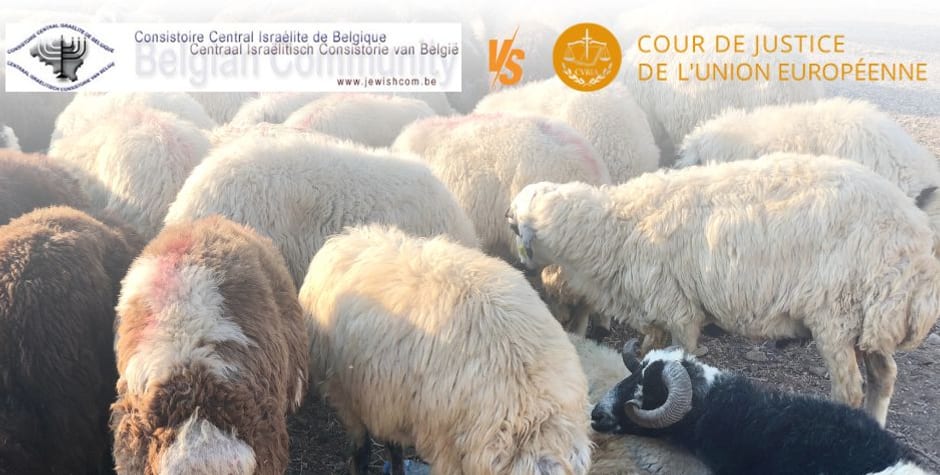

Halal & Kosher Meat: A Clash between Religion and Secularism at the CJEU
CJEU's Ruling on Halal & Kosher Meat
The Court of Justice of the European Union (CJEU) fired a warning shot for religious minorities when it issued its first judgment on religious liberty issues in 2017.[1] Three years later, the Court delivered its most explosive judgment in this realm yet, when it upheld a Belgian law that effectively prohibited certain religious practices of Jews and Muslims.[2] That case, Centraal Israëlitisch Consistorie van België v. Vlaamse Regering, offers a glimpse into the clash between secularism and religion in Europe’s most elite institutions. This article examines the Centraal Israëlitisch judgment and notes areas of inconsistency in the argument before addressing the underlying spiritual debate represented by this ruling.
A unique ritual under fire
Centraal Israëlitisch revolves around the unique practice of ritual slaughter in Muslim and Jewish communities, known as “Qurban” and “Shechita,” respectively.[3] Although not common to the Christian tradition, Qurban plays an important role in the Muslim community, which celebrates a festival known as “El al-Adha” wherein the head of a household slaughters an animal to provide food for himself, his family, and the poor.[4] Similarly, Shechita is the slaughter technique performed by Jews to obtain kosher meat.[5]
The issue of ritual slaughter would likely be considered niche and unremarkable, if it did not run directly against prevailing secular thought on animal welfare in Europe. As the continent became more cognizant of animals’ experience of pain and suffering, legislatures began drafting laws requiring producers of meat to minimize unnecessary suffering. Specifically, the EU published Regulation No. 1099/2009, which states that “any person involved in the killing of animals should take the necessary measures to avoid pain and minimise the distress and suffering of animals during the slaughtering . . . process.”[6] Importantly, this legislation carved out an exception for religious communities who practiced ritual sacrifice, namely the aforementioned practices of Qurban and Shecita.[7]
Challenges to this religious exception began in 2018, when the government of Belgian Flanders[8] refused to license temporary slaughterhouses for the El al-Adha festival.[9] When brought before the CJEU, the Court affirmed the government’s rule, much to the dismay of Belgian Muslims, who now had to fund permanent slaughterhouses they would only use three days a year. One year later, that same community lost again at the CJEU. This time the Court prohibited them from labeling meat prepared via ritual slaughter as “organic.”[10] Seemingly emboldened by their wins at the highest court in Europe, the Flemish government went further in 2019 by removing the religious exception to Regulation No. 1099/2019 completely and requiring all butchers to stun animals for slaughter, even those performing Qurban.[11] In a show of atypical solidarity, Jewish and Muslim communities banded together to protest this new regulation, only to lose yet again.[12]
The Centraal Israëlitisch judgment can be divided into two sections corresponding to the three questions the Court is asked to answer. The first two questions jointly ask whether EU law allows the Flanders government to create additional slaughtering regulations that restrict religious groups, while the third question asks whether the regulation at issue violates the EU Charter by discriminating against Jewish and Muslim communities.[13]
An opinion riddled with inconsistencies
In answering the first two questions, the Court begins by acknowledging that the Flemish law limits Muslim and Jewish communities’ rights to manifest their beliefs, thereby infringing on their freedom of religion.[14] Yet, in the same breath, the Court points to ECHR precedent which allows freedom of religion to be curtailed by the state so long as it is “proportional” and “necessary to meet objectives of general interest recognized by the European Union.”[15] The Court then argues that the universal requirement to stun animals is not a prohibition on ritual slaughter per se, even though it earlier acknowledged certain Jewish and Islamic groups believed stunning was incompatible with their requirements for ritual slaughter.[16]
In addressing whether the restriction on religious freedom is proportionate, the Court takes a two-pronged approach. First, it emphasizes that the stunning is reversible—which seemingly satisfies the judges’ minds that stunning is compatible with Qurban, even if it doesn’t convince the practitioners—while using division among Member states on this issue to justify a wide margin of appreciation for the Flemish government to do as it wishes.[17] Second, it cites the European Food Safety Authority (EFSA) to affirm that stunning is the most effective way to minimize animal pain and suffering, and emphasizes that laws regarding animal suffering should follow the latest scientific developments.[18] The reader will notice a distinct lack of citation to any Muslim or Jewish sources on the significance of live slaughter and whether stunning is compatible or not—perhaps hinting at an underlying lack of respect the Court directs toward that line of religious argument.
The Court proceeds to finish its answer on whether a state can curtail religious freedom for the sake of animal welfare with two exclamations. First, seemingly as an ode to progressive jurisprudence, the Court declares that the EU charter is a “living document,” the values of which should shift and change with the opinions across Europe.[19] Even though animal rights were only mentioned in the Annex to the European Community Treaty, it is simply more current than the old-fashioned religious rights that the EU Charter thought important enough to include.[20]
The Court then supports its contention that the restriction is “proportionate” by remarking that the law does not prohibit these communities from importing meat from locations that permit proper ritual sacrifices.[21] This argument misses the mark for two reasons. First, the court had already acknowledged that Poland (the chief source of Shechita meat for Belgian Jews) was working on a law prohibiting ritual meat exports, so the supposed benefits this argument alludes to aren't real.[22] Second, this argument misses the central objection of Muslim community: it prohibits the practice of ritual sacrifice according to their beliefs. This is roughly equivalent to justifying the prohibition of consecrating the Eucharist prior to its consumption by noting that the prohibition does not prevent Catholics from purchasing a pre-consecrated Eucharist. It is a borderline non sequitur argument that is unfortunately repeated in the Court’s next section, where it addresses the question of whether that particular law discriminated against religious groups.
Economic justification for religious discrimination
The allegation of religious discrimination rested on the argument that the Flemish law was discriminatory for prohibiting ritual slaughter without stunning while still allowing recreational hunting and fishing to continue without the stunning of animals.[23] The Court responded that ritual slaughter and recreational hunting and fishing were not analogous with two arguments.
First, it asserted that recreational fishing and hunting produce only a marginal amount of meat and thus have no effect on markets of the animal’s origin, making it outside scope of the original EU regulation.[24] Yet, the Court previously acknowledged that Jewish advocates had argued Shechita slaughter account for only 0.1% of meat produced in Belgium.[25] Surely 0.1% would be considered marginal, but the Court failed to even address this point in its discussion on the discrimination question.
Second, the Court argued that the terms “hunting” and “fishing” would be rendered meaningless if their participants were required to first stun animals before they were killed.[26] Here, the Court oversteps its authority and makes an implicit ontological assertion about the nature of Qurban and Shechita rituals. The Court implies—without any religious backing—that ritual slaughter still retains the same meaning even with a new requirement of reversible stunning. The weight of this argument should not be understated: the Court has just tried to redefine an Islamic and Jewish practice in the name of promoting animal rights. Not once does the Court offer any religious citation or consultations to affirm this new definition. In fact, the only religious voices it notes are those that express doubt that stunning is compatible with Shechita.[27] Without ever addressing those objections, the Court concluded the new Flemish law was not discriminatory nor contrary to previous EU law that did carve out a religious exemption.
The religious battle within the CJEU
The arguments presented in this CJEU judgment represent a fundamental shift in the European conception of man. For hundreds of years, as Mosaic thought dominated the continent, man’s place in creation was above that of animals; the rights of man surpassed those of animals. The status of imago dei underpinned the philosophical landscape of Europe that gave birth to the concept of natural rights: rights given to human beings by virtue of their unique place in creation. Humans were to take care of animals, but they remained superior.
However, with the decline in religion and the rise of secular ethics in the West during the Twentieth century, this image began to be challenged. Most notably, Peter Singer’s 1975 book “Animal Liberation” attacked the notion that human rights trump those of animals.[28] This book brought about a marked shift in how the West came to define humanity, no longer defining it based on its unique status in a creation narrative, but instead on superior cognitive capabilities (the implication being that those of lower cognitive capability are inferior). When the CJEU uses language of a “living document” that changes with the ideas of the times, it is this shift to which the Court refers: a shift from man as the caretaker of creation to merely another animal within it.
To champions of secular progressivism, the proponents of old-fashioned Mosaic philosophy represent outdated ideas that no longer deserve any preference over other concerns of the state. This development should disturb any believer, as the common notion of man’s identity as unique among all creation is under attack. Centraal Israëlitisch is not merely a case of Flemish Muslims having to go elsewhere for halel meat; it is a warning to religious believers everywhere that their practices may not survive a clash with modern secular values in Europe’s highest court.
By Caleb Ridings.
_____________
[1] Andrea Pin & John Witte Jr., Meet the New Boss of Religious Freedom: The New Cases of the Court of Justice of the European Union, 55 TEX. INT'l L. J. 223, 225 (2020).
[2] C- 336/19, Centraal Israëlitisch Consistorie van België v. Vlaamse Regering, ECLI:EU:C:2020:1031 (Dec. 17, 2020).
[3] See generally, Rules of Qurbani, Muslim Hands, https://muslimhands.org.uk/latest/2016/08/qurbani-questions-answered-all-you-need-to-know, (last visited July 25, 2023); What is Schechita?, Chabad, https://www.chabad.org/library/article_cdo/aid/222240/jewish/What-Is-Shechita.html (last visited July 28, 2023).
[4] Rules of Qurbani, supra note 3. Whether participation in this festival is mandatory varies by school of Islamic thought, as does who should do the slaughtering, but all schools consider this festival to be very important.
[5] What is Shechita?, supra note 3.
[6] Council Regulation No 1099/2009 of 24 September 2009, On the Protection of Animals at the Time of Killing, 2009 O.J. (L 303) 2 (EC).
[7] Id. at 15. As will be touched on later, an exception to these rules was also made for recreational hunting and fishing. Id. at 14.
[8] That is the Flemish government, one of the three regional governments in Belgium.
[9] C- 426/16, Liga van Moskeeën en Islamitische Organisaties Provincie Antwerpen VZW v. Vlaams Gewest, ECLI:EU:C:2018:335 at ¶¶ 3, 16 (May 29, 2018).
[10] C- 497/17, OABA v. Ministre de l’Agriculture et de l’Alimentation, ECLI:EU:C:2019:137 (Feb. 26, 2019).
[11] Andrea Pin & John Witte Jr., Slaughtering Religious Freedom at the Court of Justice of the European
Union, CANOPY FORUM para. 11 (February 16, 2021).
[12] Id.
[13] C- 336/19, Centraal Israëlitisch Consistorie van België v. Vlaamse Regering, ECLI:EU:C:2020:1031 at ¶ 32 (Dec. 17, 2020).
[14] Id. at ¶ 55.
[15] Id. at ¶¶57-58.
[16] Id. at ¶¶ 53,61.
[17] Id. at ¶¶ 66, 68.
[18] Id. at ¶¶ 72, 76.
[19] Id. at ¶ 77.
[20] Pin & Witte Jr., supra note 11, at para. 16.
[21] Centraal Israëlitisch Consistorie, at 78.
[22] Id. at ¶ 34. This drafted law was approved by the Polish Senate; the prohibition on exporting meat produced via ritual sacrifice without stunning will go into effect in 2025. Cnaan Liphshiz, Poland will end its kosher and halal meat export industry in 2025, Times of Israel (Oct. 15, 2020 9:37 am).
[23] Centraal Israëlitisch Consistorie; at ¶¶ 82-83.
[24] Id. at ¶¶ 88-89.
[25] Id. at ¶ 20. The advocate went on to argue that “ the cases in which prior stunning fails exceed that percentage.”
[26] Id. at ¶ 91.
[27] E.g., Id. at ¶ 20.
[28] Peter Singer, Animal Liberation: A New Ethics for our Treatment of Animals (1975).












